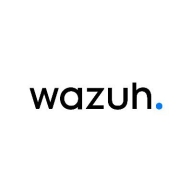

Check Point Security Management and Wazuh both serve the network security management category. Check Point Security Management offers a comprehensive security solution through its integrated security features, centralized control, and sophisticated policy management. Wazuh’s open-source nature and seamless cloud integration provide cost-effective flexibility well-suited for organizations seeking a budget-friendly solution.
Features: Check Point Security Management provides a unified platform managing multiple security tasks like firewalls, VPN, and threat prevention through a single console. It includes centralized log management and advanced security controls. Wazuh emphasizes integration capabilities, especially within cloud environments, and provides log monitoring alongside file integrity and compliance checking.
Room for Improvement: Check Point Security Management should focus on minimizing hardware dependency and improving integration and ease of use. Wazuh could expand its threat intelligence features and broaden its cloud integration scope while enhancing reporting capabilities.
Ease of Deployment and Customer Service: Check Point Security Management requires more resources for on-premises setups and garners mixed feedback concerning customer service. Wazuh benefits from its open-source model, offering easier deployment in varied environments with a reliance on community support for implementation assistance.
Pricing and ROI: Check Point Security Management incurs higher upfront costs, justified by its extensive feature set that promises strong ROI through enhanced security and operational efficiency. Wazuh delivers a low-cost entry into security management due to its open-source nature, making it appealing for budget-conscious organizations, though additional support and infrastructure can increase the total cost of ownership.
I have seen a strong ROI from using Check Point Security Management through unified policy management, reduced misconfigurations, and faster incident response.
The time to resolve issues is very much better now with Check Point Security Management.
I have seen a hundred percent return on investment with Check Point Security Management.
I have seen value in security cost savings with Wazuh, as using proprietary EDR versions could save us substantial money.
When we face technical issues, they are ready to help us.
We have partner support that helps us mitigate vulnerabilities reported by our infrastructure team.
The challenge was with drivers due to the size, and we had not provisioned the partition to the right size.
They responded quickly, which was crucial as I was on a time constraint.
We use the open-source version of Wazuh, which does not provide paid support.
The documentation is good and provides clear instructions, though it's targeted at those with technical backgrounds.
It can be a multi-domain Security Management server and can manage large or segmented environments with multiple domains or customers.
When you upgrade multiple times, you leave many files that are useless. They are dated, so it's always better to create a new machine every few versions, for example, three or four major versions.
The scalability of Check Point Security Management is excellent.
It can accommodate thousands of endpoints on one instance, and multiple instances can run for different clients.
Currently, I don't see any limitations in terms of scalability as Wazuh can still connect many endpoints.
Scalability depends on the configuration and the infrastructure resources like compute and memory we allocate.
Check Point Security Management is really stable, and I have not experienced any downtime or issues with reliability except for when we do upgrades.
The SmartConsole used to administrate the security management is somewhat unstable.
Check Point Security Management is stable and I have not experienced any downtime or reliability issues.
The stability of Wazuh is strong, with no issues stemming from the solution itself.
The stability of Wazuh is largely dependent on maintenance.
The indexer frequently times out, requiring system restarts.
When the logs are too heavy for the security management server, the CPU spike will be high, causing our management day-to-day activity to lag or become difficult.
I believe they can improve the management by allowing better API functionality because the API now is a little complicated, making it difficult to do automation.
Additionally, it crashes pretty regularly, so they could resolve the stability issues as well.
Machine learning is needed along with understanding user behavior and behavioral patterns.
The integration modules are insufficiently developed, necessitating the creation of custom integration solutions using tools like Logstash and PubSub.
I think Wazuh should improve by introducing AI functionalities, as it would be beneficial to see AI incorporated in the threat hunting and detection functionalities.
Since we are using it extensively, we get significant discounts during procurement.
Licensing is quite expensive.
We pay on a three-year base.
Wazuh is completely free of charge.
I would definitely recommend Wazuh, especially considering Fortinet's licensing model which is confusing and overpriced in my opinion.
Totaling around two lakh Indian rupees per month.
Check Point Security Management has positively impacted my organization by providing centralized control, allowing us to manage all security policies and gateways from a single console, reducing complexity and saving time.
After deploying Check Point Security Management, we improved our productivity by integrating all devices into a single console instead of managing separate log-ins for each branch's gateways, making our admin team's tasks easier.
The monitoring is exceptional as it provides consolidated logs, signals, and any alerts that come from the security gateway in real time.
Wazuh is a SIEM tool that is highly customizable and versatile.
The system allows us to monitor endpoints effectively and collect security data that can be utilized across other platforms such as SOAR.
With this open source tool, organizations can establish their own customized setup.
| Product | Market Share (%) |
|---|---|
| Wazuh | 12.2% |
| Check Point Security Management | 0.5% |
| Other | 87.3% |


| Company Size | Count |
|---|---|
| Small Business | 44 |
| Midsize Enterprise | 30 |
| Large Enterprise | 41 |
| Company Size | Count |
|---|---|
| Small Business | 26 |
| Midsize Enterprise | 15 |
| Large Enterprise | 8 |
Check Point Security Management is an advanced security management platform for enterprises. The platform integrates all aspects of security. A single platform manages the entire infrastructure, from data centers to private/public cloud deployments.
Check Point Security Management is a reliable and easy-to-use security platform. It integrates all aspects of your security environment to strengthen the security posture without impairing productivity. The system has a layered policy model. This means the security policy can be separated into layers for network segmentation. Different administrators can manage different policies. The policy layer automates the tasks.
The platform is extensible, scalable, and integrates easily with orchestration systems and change management.
Basic Components of the Infrastructure
The smart console offers several advantages. Changes in security policies and logs can be done with a click. You can navigate from an item within a log to the policy. There are also built-in multi-language support and accessibility features.
1. Security Management Server: The server manages security gateways with set security policies and monitors security events on the network.
The automation server is an integrated part of the management server. The API server is active by default on servers with 4 GB of RAM or more and on standalone servers with 8 or more GB of RAM.
The automation server communicates with the management server the same way as the Smart Console. This architecture allows the same validation errors and warnings to be presented when using an automation session.
The same audit logs generated using the Smart Console are also generated using an automation session. If you have a multi-domain environment, there is only one automation server that monitors all the IP addresses of the multi-domain management server.
2. Security Gateway is placed at the edge of the network. It monitors and filters traffic and enforces security policies.
Logging, Event management, and Monitoring
With Check Point Security Management, logging, reporting, event management, and monitoring are integrated. The platform features widgets and chart templates that optimize visibility. One of the best features is the one-click exploration. This simplifies going from a general overview to specific event details.
Benefits of Check Point Security Management
The unified console also means a single policy for users, data, applications, and networks. The granularity control helps accelerate administration processes. This feature, together with automation, is key to achieving reduced operational overhead. Security teams can automate tasks and even create self-service security web portals with the Check Point Security Management platform.
Threat management is fully integrated, with reporting, logging, and monitoring all in one dashboard. This provides full visibility into the security of the network.
Security Management Suite
The Security Management Suite consists of the following modules:
Reviews from Real Users
A Network Security Engineer/Architect at a tech services company says, "The features we like and find the most valuable are the ways we can manage the policy, create objects, and drag and drop objects in our daily operation. It makes our daily operation on the firewall management much easier than going, for example, to one firewall, then going to the other."
"The management API is the best new feature for me. It allows us to further automate our customers' automated server ordering," says a System Engineer Network & Security at OTTO GmbH & Co KG.
A Senior Infrastructure Services Specialist at St.George Bank Limited adds that "The solution is ideal for use and deployment in a large infrastructure environment."
Wazuh offers comprehensive security features like MITRE ATT&CK correlation, log monitoring, and cloud-native infrastructure. It ensures compliance and provides intrusion detection with high scalability and open-source flexibility, ideal for businesses seeking robust SIEM capabilities.
Wazuh stands out in security information and event management by providing efficient log aggregation, vulnerability scanning, and event correlation against MITRE ATT&CK. Its capability to integrate seamlessly with environments, manage compliance, and monitor files makes it suitable for cloud-native infrastructures and financial sectors. Despite its technical support needing enhancement and opportunities for improving AI integration and threat intelligence, its open-source nature and cost-effectiveness make it appealing. Users can leverage custom dashboards powered by Elasticsearch for precise data analysis, even though there is a desire for a more user-friendly interface and better enterprise solution integration. Deployment may be complex, but its features contribute significantly to fortified security postures.
What are the essential features of Wazuh?Industries like finance and cloud infrastructure heavily utilize Wazuh for its security strengths. By monitoring endpoints and ensuring compliance with frameworks, companies can improve security posture and swiftly detect anomalies. The platform's focus on event correlation and alerts for security incidents is particularly beneficial.
We monitor all Log Management reviews to prevent fraudulent reviews and keep review quality high. We do not post reviews by company employees or direct competitors. We validate each review for authenticity via cross-reference with LinkedIn, and personal follow-up with the reviewer when necessary.